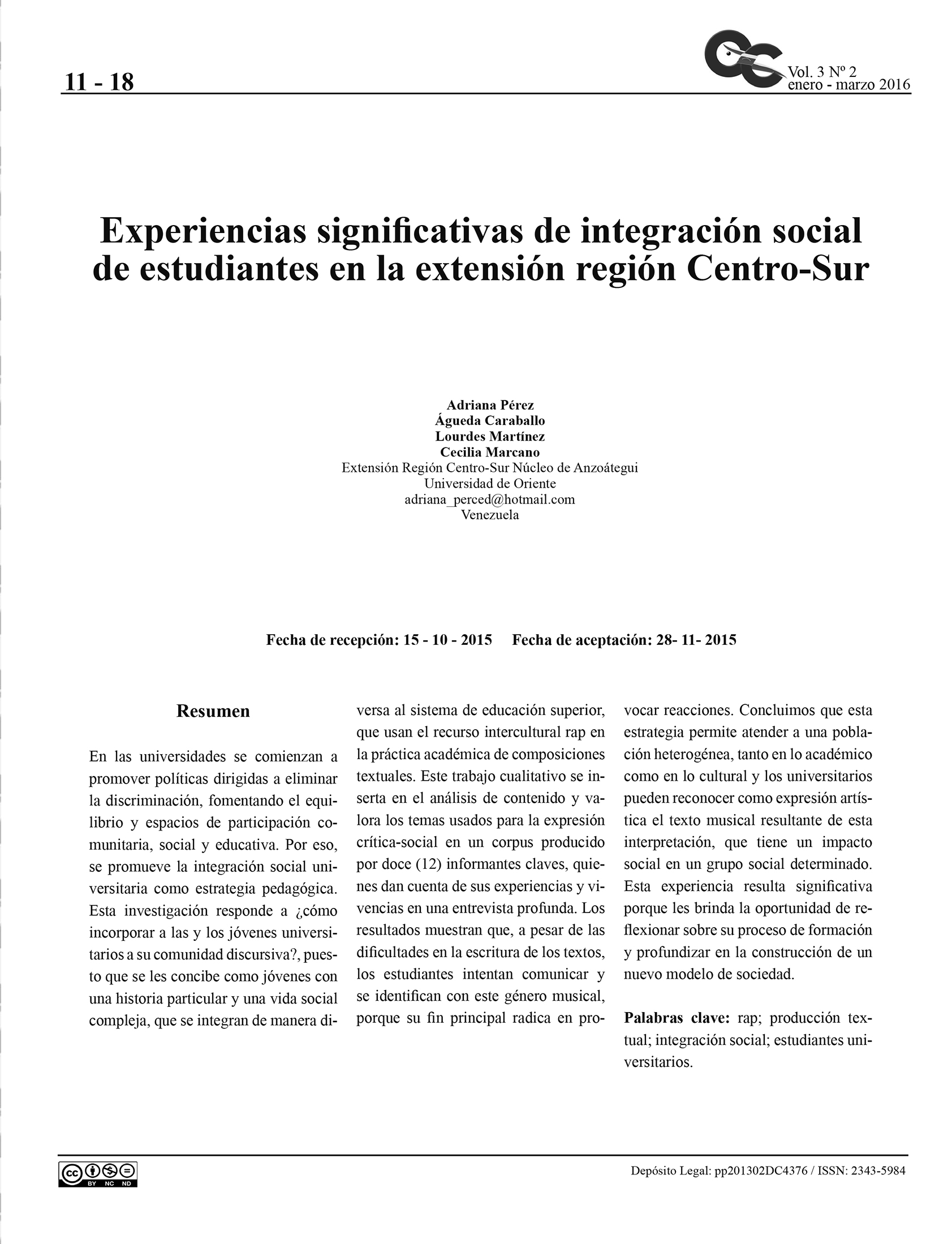Significant experiences social integration of students in extension South Central region
Keywords:
rap, text production, social integration, university studentsAbstract
Universities are beginning to promote policies aimed at eliminating discrimination, promoting balance and spaces for community, social and educational participation. Therefore, university social integration is promoted as a pedagogical strategy. This research responds to how to incorporate young university students to their discursive community, since they are conceived as young people with a particular history and a complex social life, who are integrated in a diverse way to the higher education system, who use the intercultural resource rap in the academic practice of textual compositions. This qualitative work is inserted in the analysis of content and values the themes used for critical-social expression in a corpus produced by twelve (12) key informants, who give an account of their experiences and experiences in an in-depth interview. The results show that, in spite of the difficulties in writing the texts, the students try to communicate and identify themselves with this music genre, because their main purpose is to provoke reactions. We conclude that this strategy allows to attend to a heterogeneous population, both academically and culturally, and university students can recognize as artistic expression the musical text resulting from this performance, which has a social impact on a given social group. This experience is significant because it provides them with the opportunity to reflect on their educational process and to deepen the construction of a new model of society.
Downloads
References
Abbate, J. (2008). Admisión, apoyo y retención de estudiantes no tradicionales en carreras universitarias. Revista Iberoamericanasobre Calidad, Eficiencia y Cambio en Educación (REICE). 6(3).Recuperado de: http://www.rinace.net/arts/vol6num3/art1_htm.htm . fecha de captura marzo de 2012
Cassany, D. (1999). Construir la escritura. Barcelona: Paidós. De las Calles.com. (s.f.). Cultura HipHop venezolana en suscuatro expresiones (Rap, Bbying, DJing y Graffiti). Recuperado de: http://delascalles.com/hiphop/ fecha de captura marzo de 2012
Martínez, M. (2006). Ciencia y arte de la metodología cualitativa. México: Trillas.
Morales, O., Tona, R. y Tonos, R. (2007, enero). ¿Cómo incorporar a los estudiantes universitarios a su comunidad discursiva?: la experiencia de la Facultad de Odontología de La Universidad de Los Andes. Ponencia presentada en el X Simposio Internacional de Comunicación Social, Cuba. Recuperado de: http://www.saber.ula.ve/bitstream/123456789/16474/1/ ponencias_cuba.pdf . fecha de captura marzo de 2012
Raperos.com. (s.f.). Rap venezolano. Recuperado de: http://www.raperos.com/rap-venezolano/ fecha de captura marzo de 2012
Real Academia Española. (2012). Rap. Diccionario de la Lengua Española (23a. edición). Recuperado de: http://lema.rae.es/ drae/?val=rap
Reguera, A. (2008). Metodología de la investigación lingüística. Práctica de escritura. Argentina: Brujas.
Rojas, B. (2010). Investigación cualitativa. Fundamentos y praxis. Caracas: FEDUPEL.
Roman, P. (2009). El rap en clase de lengua y literatura. Recuperado de: http://fecla.wordpress.com/2010/03/24/el-rapen- clase-de-lengua-y-literatura/ fecha de captura marzo de 2012
Sánchez, L. (2011). El hip hop en Venezuela desde la perspectiva del realismo grotesco de Mijaíl Batjin. Estudios Culturales, 7: 213-236. Recuperado de: http://servicio.bc.uc.edu.ve/multidisciplinarias/estudios_ culturales/num7/art10.pdf
Santillana. (2011). Recursos educativos. Recursos didácticos. Recuperado de: http://www.santillana.es/recursos-educativos/
Yuni, J. y Urbano, C. (2005). Mapas y herramientas para conocer la escuela. Investigación etnográfica. Investigación acción. Argentina: Brujas.

Downloads
Published
How to Cite
Issue
Section
License

This work is licensed under a Creative Commons Attribution-NoDerivatives 4.0 International License.







